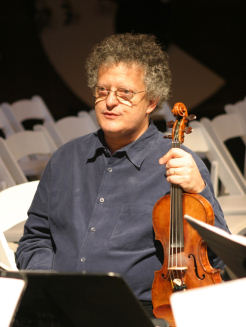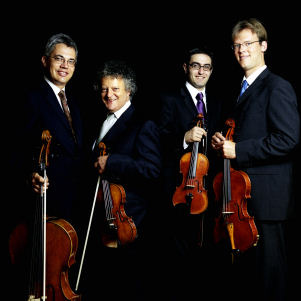|
Editorial Board
Melanie
Eskenazi
Webmaster: Len Mullenger
|
Seen and Heard Interview
Irvine Arditti talks to Anne Ozorio (AO)
Pascal Dusapin:
String Quartet No. 5
"It comes nearly 17 years after his fourth. The Arditti Quartet has perhaps had a closer association with Brian Ferneyhough. than any other living composer. From the 'rescue' of the 2nd quartet from other less fortunate hands, in 1980,we have tirelessly 'extracted' and premiered all his quartet music to date. I use the word 'extracted', as it is usually like this with Brian, receiving pages of the score at the very last moment. It is almost as if he desires pressure in order to produce the work. The 5th Quartet was no exception, with the final pages and corrections coming in the last week before the premiere. The premieer was actually in the Wittener Tage fur Neue Musik in Germany. Aldeburgh was the UK premier and 2nd performance. “
“I believe that Brian's chamber
music, in particular the quartets, are his most coherent
forms of composition. To have his complexity unleashed
but in only 4 parts to my mind allows the listener to
grasp most of what is happening. The 5th Quartet has a
greater clarity than it's two immediate predecessors.
The work uses silences or stops in the flow of the music
to punctuate andchange direction of the musical material.
This allows the listener more time and space to follow
the works development. The second movement of the 4th
quartet also has employed the same idea. What is interesting
about the 5th quartet is that it comprises a mixture of
duos, trios and quartet music. This allows more contrast
in the density of the music and therefore more contrast
for the listener. The only real solo of the work is a
brutal and aggressive cello cadenza. The second solo with
accompaniment is for 1st violin playing with a practise
mute, accompanied by the other 3 players only with normal
mutes. This requires a responsibility and intensity of
playing and thought from the leader in order to project.
(Those who saw me disappear offstage as we were seated,
just before the performance at Aldeburgh now know why).
The 5th quartet challenges it's performers with extremes
of dynamics,from the brutality and extreme fortissimi
of the cello solo to the last section of the work which
is in double harmonics and only at the limit of audibility.”
Similarly, your relationship with Francesconi goes back many years. Perhaps you could say something about his String Quartet No 4 I voli di Niccolò ?
“You might say that in our Wigmore programme, the Ferneyhough stands out on a limb, with a composer making no compromises for the listener. The Francesconi quartet is definitely more 'reachable' than much of his music but it still in the same language. Francesconi on the other hand is a composer that is very much aware of an audience and what may stimulate them. He studied with Stockhausen and Berio, but one normally hears moreinfluence from the later in his works. He has followed Berio’s sense of drama in music often developing ideas programmatically. Some recent pieces from Francesconi have gone some distance to being more accessible to the listener. His latest quartet Il Voli is one of these. The work was commissioned by the Genoa Festival in Italy and the premier took place in late 2005 in the Casa Paganini. The composer says the piece is like a journey by Paganini into present day time. I am not sure I follow this, as I find the first movement the most challenging and the most ‘modern’ sounding. Perhaps that Paganini is dropped into the 20th/21st Century and at first finds it the hardest to relate to his roots... There are parts of the finale that descend into what seems like ‘country’ fiddling. Certainly Francesconi has maintained some of the extreme virtuosity and difficulty of Paganini’s music in the outer movements, sometimes going beyond what is possible. In fact the score had to be slightly revised because of this problem. The middle two movements employ much pizzicato writing, something not so common in contemporary string quartet writing. These accelerate in steps beyond what is normal considered possible. Francesconi has produced an exciting music where the form and direction of the piece is easy to follow. “
Dusapin's String Quartet No 5 was also completed barely a year ago. What should we listen for ?
“Pascal Dusapin is another composer who has mellowed in recent years. His first pieces had a ruggedness that was reminiscent of his teacher, Xenakis. In recent years his style has become much more lyrical. The new quartet oscillates between this Lyricism and more hard edged material. The work admits to a Becketian influence and the conversations between Mercier and Camier. Although this might have been a strong influence on the composer, for me, the Beckett is a far more abstract influence more for the composer than the listener. There is only one section in the work about two-thirds of the way through where one could really acknowledge this influence and there is a long static section of fast notes played in unison rhythm by the quartet at a softer than whisper dynamic. It is a point where you the work becomes gestural, something not at all uncommon in contemporary literature but rather strikingly unusual in this piece. The work had started with a long pizzicato section for the lower three instruments as a carpet for a very high, birdlike solo for the primarius. Dusapin’s harmonic language seems more and more to incorporate an Arabian flavour inspiring couscous rather than seriously rich sauces.”
“The Moments Musicaux are perhaps the most dark and introverted music of the evening. In this suite of 6 movements, Kurtág reuses music from other compositions such as in the final movement which is 'Les Adieux- in Janácek's Manier', as used in the seventh book of Játékok. We also see material that has been used and discarded from an earlier composition, Zwiegesprache for quartet and electronics that Kurtág devised with his son. I think Kurtág the man and teacher is such a strong influence and personality that it is impossible to disassociate him from the playing of or listening to, his music. It is almost as if the score is sparsely covered with notes and directions in order that Kurtág the teacher can follow close in the wake to instruct how to play. We invited Kurtág to work with us for one day last November and this was a marvellous and refreshing experience. It is an essential part of the preparation of any new work by Kurtág. This instruction comes honestly and devoutly from this octogenarian as if like a religious act. The difficulty is how to understand this ‘lesson’ and incorporate its practicalities into ‘our’ interpretation of the work”!
Anne
Ozorio
Suggested listening :
Ferneyhough: Quartet for Strings No 4, and other works, The Arditti Quartet and soloists, Montaigne
Dutillieux, Dusapin: Ainsi le nuit, Time Zones, Quator III, the Arditti Quartet, Montaigne
Kurtag: String Quartets, The Arditti Quartet, Naive
Francesconi : Terzo Quartetto, Plot in fictio, The Arditti Quartet, Montaigne
Back to the Top Back to the Index Page |
| ||
|
||||




